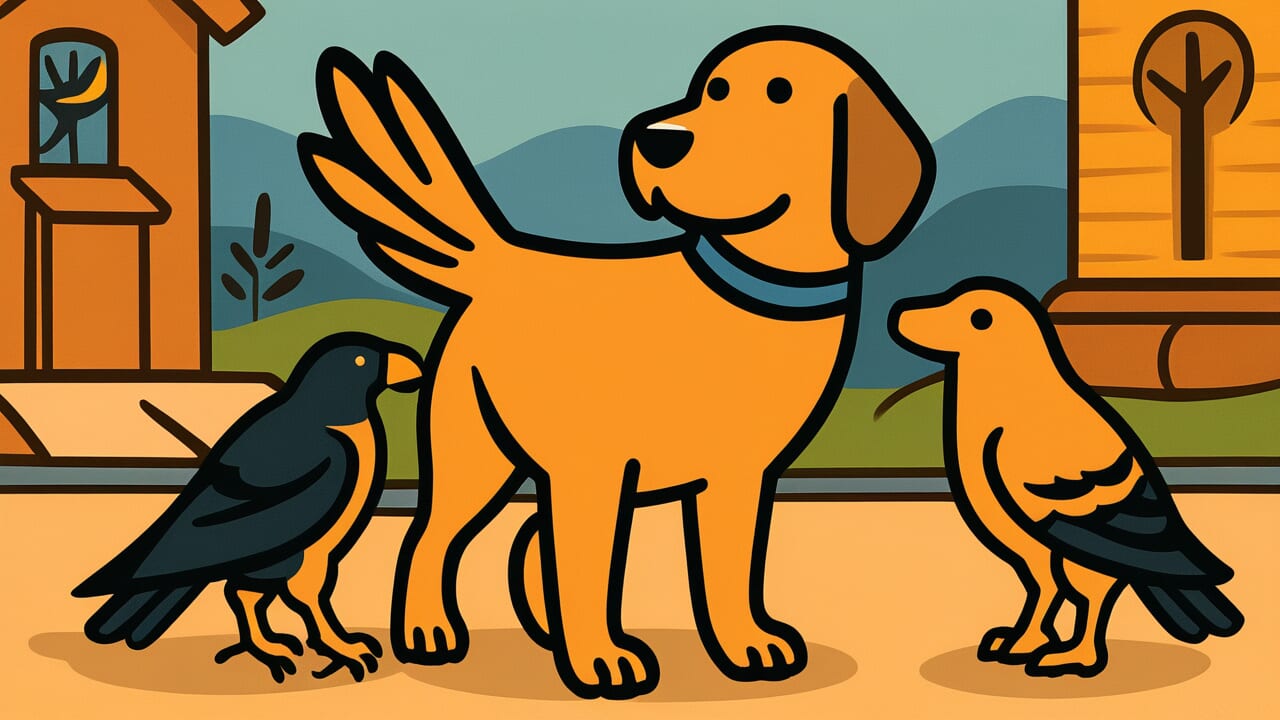How to Read “Dogs are companions, hawks are companions too”
Inu mo hōbai taka mo hōbai
Meaning of “Dogs are companions, hawks are companions too”
This proverb means that people should be treated equally as companions, regardless of their status or type.
By calling both dogs and hawks “companions,” it teaches that equal relationships can exist beyond differences in position or rank.
This saying is used in workplaces and organizations where people with different positions, experience levels, and specialties work together.
Even though hierarchies and expertise differences exist, those working toward the same goal should respect each other as equal companions.
Today, this teaching connects with ideas of diversity and inclusion.
It shows the importance of respecting each other as team members, beyond differences in age, gender, nationality, or occupation.
The proverb especially warns against people in higher positions looking down on others or dismissing those with different specialties.
Origin and Etymology
No clear written records explain the origin of this proverb. However, the structure of the phrase reveals an interesting background.
“Hōbai” originally referred to people who studied under the same teacher or served the same lord.
In other words, it meant companions of equal standing. The deep meaning lies in applying this word equally to both dogs and hawks.
Let’s look at the pairing of dogs and hawks. During the Edo period, falconry was important training for samurai.
Hawks were treated as very noble birds. Dogs, on the other hand, were familiar as guard dogs and hunting dogs, but lacked the prestige of hawks.
These two animals are thought to symbolize class differences in human society.
In actual falconry, both dogs and hawks participated in the hunt together.
The noble hawk and the ground-running dog were companions working toward the same purpose.
From this came the teaching that those working together should be treated equally, beyond differences in status or type.
Samurai society had strict class systems. Yet in actual work situations, cooperation beyond position was necessary.
This proverb is believed to have emerged from such practical wisdom.
Usage Examples
- Whether newcomer or veteran, dogs are companions, hawks are companions too, so we should listen to everyone’s opinions equally
- Even though we’re in different departments, let’s cooperate with the spirit of dogs are companions, hawks are companions too
Universal Wisdom
This proverb has been passed down through generations because it brilliantly captures the contradictory human desires for both “hierarchy” and “equality.”
Humans instinctively want to create hierarchies. Organizations naturally develop vertical relationships, and differences in expertise create feelings of superiority.
This may be natural as a survival strategy. Yet humans also have a strong desire to be treated equally.
Anger at being looked down upon and joy at being respected remain unchanged across time.
The deep wisdom of this proverb lies in showing a path to equality without denying hierarchy.
It uses clearly different beings—dogs and hawks—while connecting them through the equal relationship of “companions.”
In other words, it teaches a mature way of human relationships: acknowledging differences while maintaining equality as companions.
Everyone tends to become arrogant when in a higher position. Conversely, in lower positions, people become servile or rebellious.
But truly strong organizations and relationships are built on mutual respect beyond positional differences.
Our ancestors understood this essence of human relationships. That’s why these simple words still resonate with us today.
When AI Hears This
In game theory, “what constraints exist in the game” determines cooperative relationships more than the power balance between players.
Considering dogs and hawks as an example reveals an interesting structure.
Dogs run on the ground, hawks fly in the sky. Their abilities and ecology are completely different.
Normally, neither competition nor cooperation would be possible between them.
But the moment the constraint of “serving a master” is added, both become players in the same game.
What’s important here is that the third party—the master—creates a “common evaluation axis” between dog and hawk.
In other words, they’re evaluated not by which is superior, but by whether both contribute to the master’s goal.
This is exactly the concept of “coalition value” in cooperative games.
The same structure appears in modern organizations. Sales and engineering departments have completely different abilities.
But under the common constraint of “company profit,” they’re equal players.
Game theory research shows that cooperation between such heterogeneous players is more stable than cooperation between homogeneous players.
This is because non-overlapping roles reduce resource competition.
This proverb strikes at the core of organizational design: constraints design cooperative relationships.
Differences in ability aren’t factors for conflict, but rather foundations for cooperation.
Lessons for Today
What this proverb teaches modern people is that true strength lies in the power to respect others.
We interact daily with people in various positions. Boss and subordinate, senior and junior, expert and beginner.
At such times, do you look down on others because of positional differences, or conversely, put yourself down?
This proverb gives us a chance to reconsider such attitudes.
Specifically, it means listening seriously to newcomers’ opinions in meetings.
It means not dismissing other departments’ work as “not my concern.” It means not ridiculing simple questions from non-experts.
These small practices create an environment of high psychological safety around you.
Most importantly, this proverb makes your own life easier. You don’t need to shrink back because your position is lower.
You too are a proper companion. You can express opinions with confidence and exist with dignity.
When you acknowledge differences yet respect each other equally, true companions will gather around you.
That is the warm yet powerful message this proverb offers to those of us living in modern times.



Comments